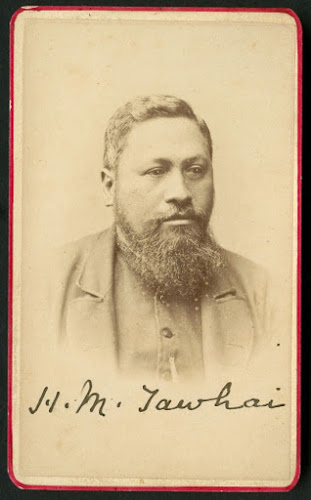Pioneering Exporters: The Early Maori Wheat Trade
It is well known that Maori were major players in the New Zealand economy in the first two decades after the Treaty of Waitangi was signed in 1840. Many European settlers to the country during this period were reliant upon Maori for their basic supplies, while Maori labour was vital to the construction of new roads and other key infrastructure. But Maori were also contributing greatly to the colony's exports. By the mid-1850s many Maori communities were exporting vast quantities of wheat to Australia, via Auckland, to feed the huge influx of miners attracted by the gold rushes. It was a lucrative trade. But then, early in 1856, the price of wheat fell dramatically. Maori responded by withholding their produce from sale. That prompted the government's Maori-language newspaper, Te Karere Maori, to issue the following advice:
Native readers will observe in the market prices current published in this journal every month, that the prices of wheat, potatoes, and other New Zealand produce, are subject to constant change and fluctuation, arising from circumstances which many of the Natives do not yet fully understand, and which they are sometimes apt to attribute to a disinclination on the part of the Europeans to give them a fair value for their produce, This, however, as we shall presently show, is not in reality the case. During the last few years a great many Europeans from England and other parts of the world have been attracted to the neighbouring colonies, in search of gold. In fact, many of the Maories have gone to Port Philip, Geelong and other parts of Australia in search of gold also. Now these numbers required to be fed; and as there was not much wheat grown in Australia, that necessary article of food became scarce; and New Zealand being within a few days sail of Port Philip, they sent over here to purchase wheat and potatoes, for which they gave high prices. The Natives as well as the European farmers in this country hoped that those prices would continue; but many of the people of New South Wales, finding the prices so very high left off gold digging; and having a large extent of fine rich land, they turned their attention to wheat growing. The crops raised by them this last year have been so abundant and good that they do not require to send to New Zealand for grain; therefore, the price of that article has fallen very much. Other articles of consumption have fallen in proportion; so that the European and Native farmers in New Zealand have been greatly disappointed. Great quantities of wheat and potatoes have been raised in California, and conveyed to New South Wales; and if a scarcity of food was to arise in New Zealand, ample supplies could be obtained from the same sources. This need not discourage the Natives from growing crops, as they are always sure of a remunerative price for what they grow; but they should not obstinately lose opportunities of sending their produce to market, by waiting for a higher price, as they are already aware that these fluctuations are as likely to cause a reduction as an advance in price. Markets are always very uncertain; the price one day is not the same the next. A vessel loaded with flour coming into Auckland now would reduce the price of wheat even lower than it is at present, as no one would purchase; while, on the contrary, if there was no supply, the price would rise in proportion to the demand. The wisest course is to sell when a fair price can be obtained; as nothing is gained by keeping perishable articles beyond a certain time,—it may even result in great loss to the holders of such property. (Te Karere Maori/Maori Messenger, 31 July 1856).
Although wheat exports recovered the following year, by 1860 the trade had ceased altogether. It was becoming clear that pastoralism, rather than agriculture, would provide the mainstay of the New Zealand economy. But Maori trade and commerce would be dealt a devastating blow over the following decade as a result of the New Zealand Wars: multiple villages were destroyed, lands seized and confiscated, and markets blockaded or severely disrupted. Simply surviving became a priority for many. From being pioneering exporters, Maori were largely shut out of the most lucrative parts of the local economy.



Comments
Post a Comment